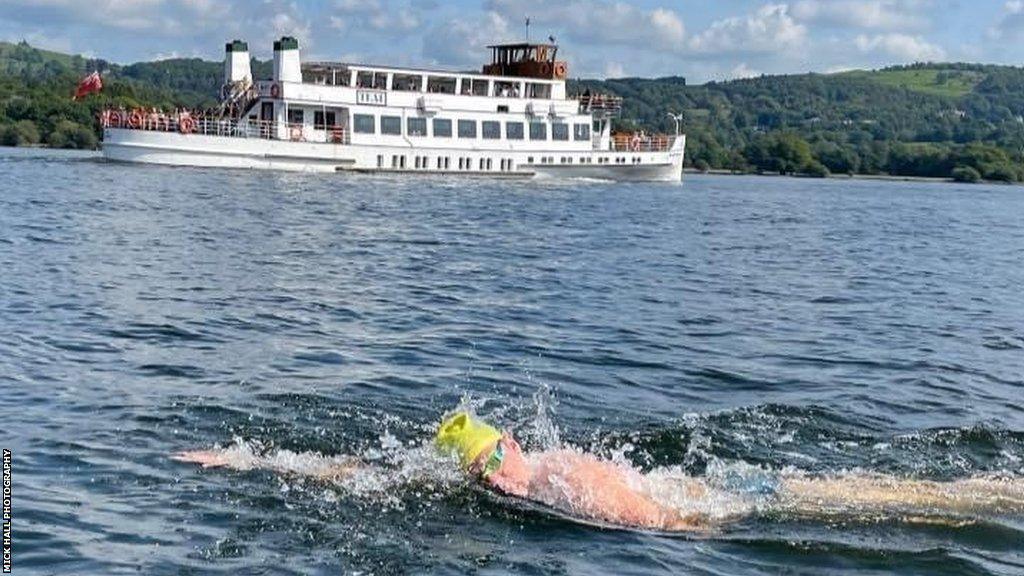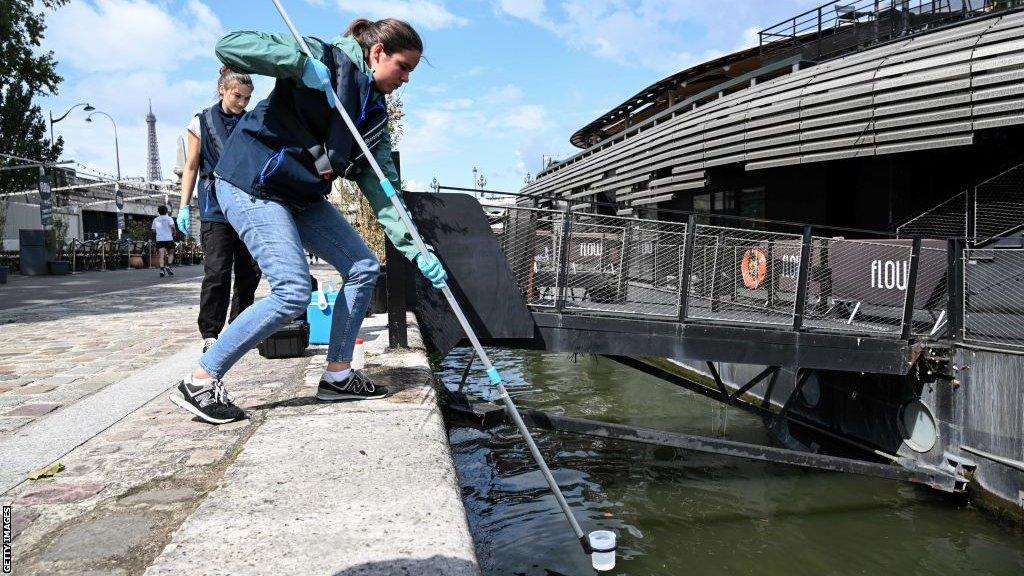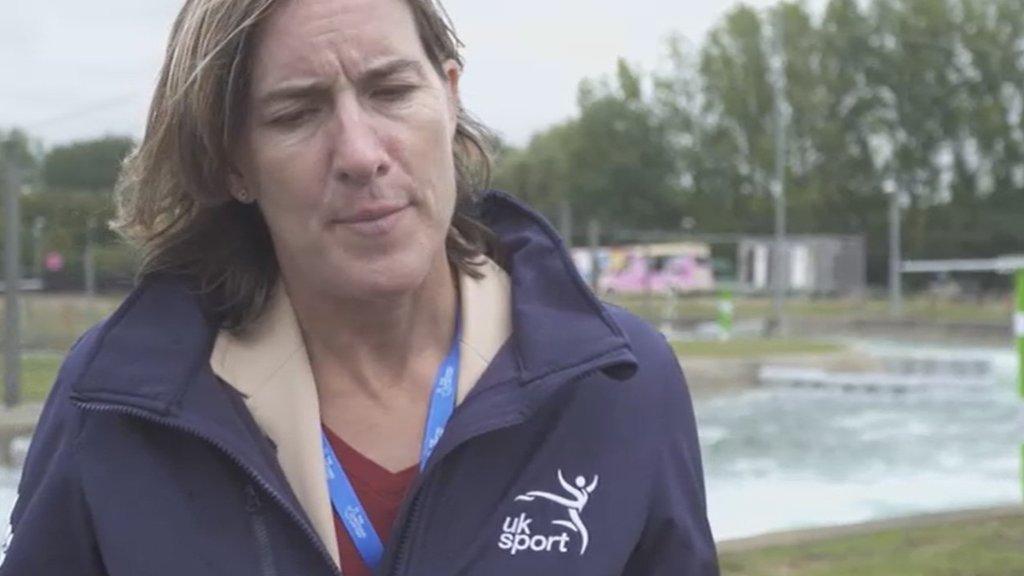Sustainability in sport: 'Water companies need to be held accountable'
- Published

Olympic swimmer Pardoe broke the record for swimming the length of Windemere in September
At 22, Hector Pardoe is every bit an athlete in his prime. Confident, motivated and in the kind of physical shape most can only dream of.
Proven, when he broke the record for swimming the length of Windermere this month. Smashed it, in fact, by eight minutes, after it stood for 26 years.
But then Pardoe is an Olympic marathon swimmer - and hoping to compete at the Paris Games next year. Preferably without getting very ill trying to get there.
"I'm not a water connoisseur, but if it's bad quality you can kind of tell from the colour. In the UK, 30% of people get sick after wild swimming - it's a huge issue."
Pardoe's reason for swimming a 17km lake without a wetsuit (as the rules prevent you above 18.1 degrees) is to raise money for charity to help treat Windermere and the district's 15 other lakes. He wants to swim those other 15 in the future "and I don't want to experience poor water quality and sewage".
The water in Windermere did not cause Pardoe any problems during his record-breaking swim, even if the exertion did - he became hyperglycaemic with 5km to go.
But raising awareness of water quality is something that is very important to Pardoe, and to many in his community.
At the Sunderland triathlon in July, 88 competitors fell ill after competing in the water.
An interim report said the majority of sickness was caused by norovirus, of which the source was unknown. British Triathlon and the local water company confirmed the water had tested safe on the day of competition and no sewage was released.
The issue of pollution has also been raised by athletes including windsurfer Sarah Jackson, who said England's south coast was like "surfing through sewage", and several competitors at the Henley Regatta complained of sewage in the River Thames.
"I raced in Portugal this year in Setubal - that was on the coast," Pardoe said. "There were loads of dead, washed-up fish on the sand, and rats. Seeing dead rats and fish on the beach where you're racing; it can't be good - and that's the pinnacle of the sport."
And while it is not just a problem in the UK, one statistic from the House of Commons Environmental Audit Committee is particularly shocking: 14% of rivers and lakes in England are considered safe to swim in. In Austria, it is 98%.

The water in the River Seine has been extensively tested before the 2024 Paris Olympics
'Water companies think dumping sewage is acceptable'
French triathlete Cassandre Beaugrand, Pardoe's partner, raced in Paris' River Seine for the Olympic triathlon test event this summer. After winning a silver medal she fell ill, as did Pardoe subsequently.
"It could have been numerous reasons for why that was," Pardoe says. "The water quality was deemed safe on the day - below the 1,000 ufc per 100ml ecoli level World Triathlon and the World Health Organisation deem safe. I could have put air conditioning on too low… or, becoming ill from my partner swimming in the Seine."
The Seine is a big focal point as so many events are expected to take place in next year's Olympics - but Pardoe's own test event there was cancelled after the water quality became too poor, simply because it rained. And last month the swimming leg of the World Triathlon Para Cup in Paris - a test event for the Paris Paralympics - was cancelled following "discrepancies" in water quality tests from the Seine.
The 2024 Paris organisers have announced "enhanced measures" in water quality in the lead-up to the Games.
"The day before, the ecoli levels were at 8,000 - those were rumours, but we saw stats of about 4,800, where the ecoli measurement level caps, so it was off the scale effectively. If we'd raced in that, 60% of us would get sick.
"Water quality becomes worse after rain. When it rains, sewage companies think it's acceptable to pump sewage into open-water bodies [lakes and rivers] because they think the fresh water landing from rain will dilute and almost mask the pollution they are pumping in. And it doesn't, and it really hinders our ability to swim in the open water.
"But also all of our drinking water comes from these natural bodies. I know it's filtered, but the worse the quality of the water is, the more filtration there is so it just increases the price for us who are drinking it at home.
"It's about holding sewage companies accountable for it; there's already laws in place that charge the sewage companies for doing it and it's not always being picked up on, so new laws need to be stricter and regulate the whole process."
In May this year, water companies collectively took responsibility for the issue of sewage spills into British waterways and apologised, pledging to invest £10bn to put the problem right., external
In a statement provided to BBC Sport, Water UK - the body that represents the British water industry - said: "We recognise that more should have been done sooner to tackle the harm to our rivers and seas caused by sewage spills. We have listened and have a plan to start to put it right."
Several water companies are now under investigation for alleged illegal dumping of sewage, external from treatment works.

Dame Katherine Grainger has had her own bad experiences of competing and training in contaminated water
Who can make changes?
Having won several Olympic medals in rowing, including gold at the London 2012 Olympics, Dame Katherine Grainger knows what it is like to win on the water, but also what else can lurk there.
"Anything that causes problems either with an ability to perform or affects athletes' health… to think they get set back because of issues in environment we can do something about; it is very frustrating," says the 47-year-old, who is now chair of government agency for sporting investment UK Sport, and sees water quality as a big issue.
"I've been at competitions or training venues where the water has been less than ideal - conscious of trying not to get it splashed or trying not have it on you in any way… don't inhale it when getting out of the water because there's things in the water that are very dangerous to your health."
Grainger wants water-based sports in the UK to come up with solutions for change, and says she is in a position to speak to the environment minister and "cross-working groups".
But she also wants others to help raise awareness of the problems - including current athletes, such as Pardoe.
"I'm immensely proud of the new generation of athletes we have - so passionate and so unwilling to accept the situation and to ask why, who is responsible, who is accountable and where can changes be made.
"I was aware of it in the past, but I'm almost disappointed in myself [about] why wasn't I asking those questions."
Grainger was speaking at the Canoe Slalom World Championships, taking place in London at the Lee Valley White Water Centre, where British Canoeing is one such sport looking to establish initiatives to fight the issue of water pollution.
Ben Seal, head of access and environment from British Canoeing, said: "We're getting more data [about pollution] these days - we know it is getting worse from data we're seeing, we need the government to go further, faster to stem the tide of sewage pollution.
"We're putting pressure on the water companies, the water sector, the regulators, the Environment Agency and politicians, primarily for them to understand the waterways are used by recreational users - it's paramount we protect environment, but also we protect the people who derive enjoyment from these places, whether it be swimming of paddling.
"There's some really quick wins here. It's not just about spending billions on new infrastructure - it's about government using legislation we've got to enforce it."
In a statement to BBC Sport, a spokesperson for the Department of Environment Food and Rural Affairs said: "We are unequivocal that polluting our rivers and the subsequent disruption it causes to recreational sports is unacceptable. Our Plan for Water sets out more investment, stronger regulation, and tougher enforcement to tackle every source of water pollution."
The Paris Olympics is the biggest platform of all to send a message for change - somewhere Pardoe is hoping to be once he has qualified for his marathon swimming event.
"Raising awareness on the issue is huge - letting people know about what is happening," he says.
"I went and saw the course on the Seine and saw all the monuments and the view of the Eiffel Tower. In open water swimming we don't get to see these monuments while we're actually in the water, but I can't wait.
"We quite often race in seas, just swimming out from the shore and the fans can't see it… the TV angles aren't great. The future for our sport is races in rivers through cities where spectators can come down and watch."
Pardoe, among a growing number of athletes and sports fans, just hopes the water will be clean enough for that to become a reality.